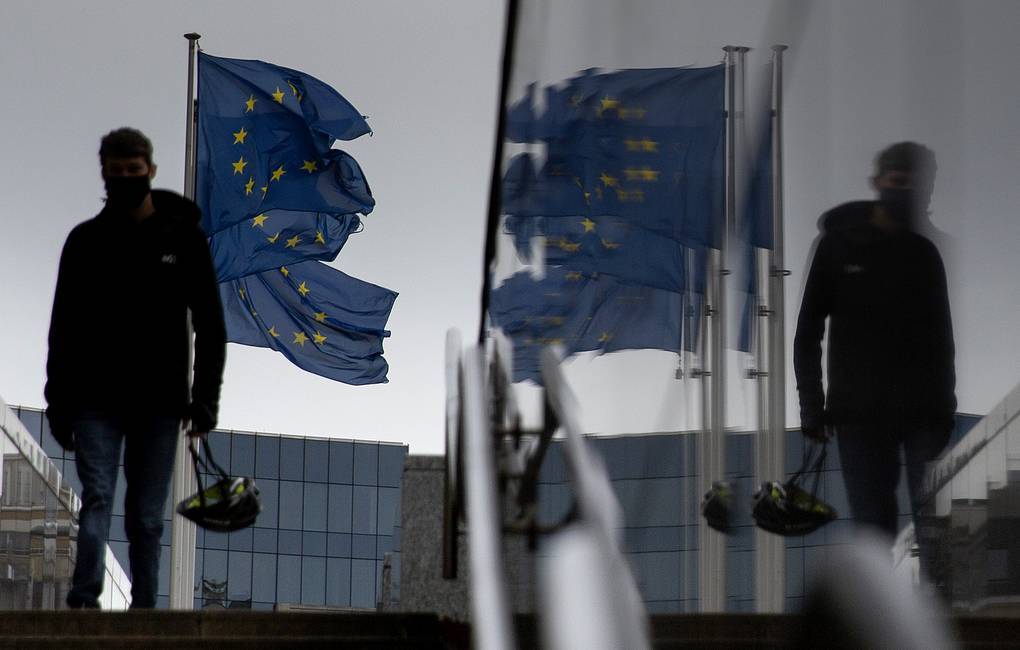European Union leaders have adopted an eighth sanctions package against Russia, expanding import and export bans over its “aggression against Ukraine.”
The fresh set of sanctions targets Russia’s seaborne oil export to third countries where the crude is priced higher than the oil price cap on Russian crude agreed upon by the G7 group of leading economic nations.
“Today's package marks the beginning of the implementation within the EU of the G7 agreement on Russian oil exports,” reads a press statement issued on Thursday.
“While the EU's ban on importing Russian seaborne crude oil fully remains, the price cap, once implemented, would allow European operators to undertake and support the transport of Russian oil to third countries, provided its price remains under a pre-set “cap.”
In early September, the leaders of G7, including Canada, France, Germany, Italy, Japan, the United Kingdom, and the United States, agreed to cap prices for Russian oil in order to both deprive Moscow of a major revenue stream and curb surging global energy prices. Under the deal, EU and G7 countries will ban banks from financing the purchase and sale of Russian oil, insurance companies from insuring shipments, and ports from unloading oil transported by tankers if it is traded at a higher price than that fixed by the European Union. The embargo on all services related to oil exports is to come into force on December 5. Until then, the ban on imports of Russian oil supplied by tankers will apply only to EU and G7 members, while other countries would still be able to buy Russian oil but only at a fixed maximum price.
European Union's price cap was sharply criticized by Russia. Speaking in Vienna after OPEC+ ministers agreed to output cuts of two million barrels per day, Russian Deputy Prime Minister Alexander Novak reiterated a warning that his country won’t sell oil to any countries that adopt such a cap.
“The price cap creates a very bad precedent and will primarily hit the ones who are actually doing it,” Novak said in a Bloomberg Television interview. “This mechanism is unacceptable to Russia.”
Novak went further to say that such a move can “only lead to a deficit,” citing shortages in some regions, higher shipping costs, later deliveries, and “quite a lot of shocks and volatility.” According to his calculations, the price cap on oil sales would reduce Russia’s oil production from 530 million tons this year to 490 million tons in 2023.
Along with the oil embargo, the new package also sanctions individuals and legal entities involved in the so-called “referendums” and illegal entry of internationally recognized territories of Ukraine into Russia, as well as officials and military of the Russian defense sector, companies supporting the Russian army, and propagandists. It also includes additional import restrictions worth almost seven billion euros, including a ban on imports of Russian steel products, plastics, vehicles, textiles, footwear, leather, ceramics, certain chemical products, and non-gold jewelry.
The EU introduced new sanctions amid the biggest land grab in Europe since World War II when President Vladimir Putin incorporated four regions of Ukraine into Russia.
Newly incorporated territories form 15 percent of Ukrainian lands that, before 2014, were home to 8.5 million Ukrainians. The Kherson region and part of neighboring Zaporizhzhia came under Russian control as a result of the ongoing war that began on February 24. Russia also controls about 60 percent of Donetsk and 70 percent of Zaporizhzhia, where fighting has raged close to Europe’s biggest nuclear plant.
What the Western countries called the “annexation” of the regions came shortly after President Putin recognized Kherson and Zaporizhzhia as independent states. He also signed a similar decree shortly before invading Ukraine, in which he recognized two separatist regions in the east of Ukraine, Lugansk and Donetsk, as independent entities.







 Azerbaijan and Armenia started the process of demarcation of their border on Tuesday, with the installation of the first border markers based on ge...
Azerbaijan and Armenia started the process of demarcation of their border on Tuesday, with the installation of the first border markers based on ge...
 President Aliyev emphasized the critical role of the North-South Transport Corridor in fostering transport cooperation between Azerbaijan and Russi...
President Aliyev emphasized the critical role of the North-South Transport Corridor in fostering transport cooperation between Azerbaijan and Russi...
 Russian Foreign Minister Sergei Lavrov has reasserted that Moscow has no intentions to stop the fighting in Ukraine, even if peace talks commence.
Russian Foreign Minister Sergei Lavrov has reasserted that Moscow has no intentions to stop the fighting in Ukraine, even if peace talks commence.
 Iran has refuted reports of alleged damage to Shimon Peres Negev Nuclear Research Centre located southeast of Dimona, Israel, during the recent air...
Iran has refuted reports of alleged damage to Shimon Peres Negev Nuclear Research Centre located southeast of Dimona, Israel, during the recent air...
 Iran and Pakistan have signed eight cooperation documents in various fields, and agreed to strengthen ties to fight terrorism in the region.
Iran and Pakistan have signed eight cooperation documents in various fields, and agreed to strengthen ties to fight terrorism in the region.



